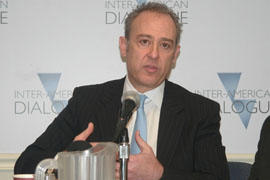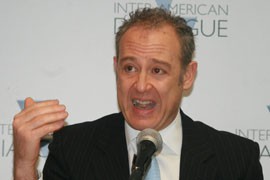Cronkite News has moved to a new home at cronkitenews.azpbs.org. Use this site to search archives from 2011 to May 2015. You can search the new site for current stories.
Mexican ambassador says now is the time for immigration reform
WASHINGTON – The Mexican ambassador to the United States said Wednesday that immigration reform is vital for relations between the two countries and that the time for reform is now.
“I’ve said it before – I don’t think there’s as an important issue for the future wellbeing of our bilateral relationship than getting immigration reform right,” Arturo Sarukhan said at a news conference in Washington.
“I think the time is ripe,” he said.
That comment was echoed later Wednesday by President Barack Obama, who said in an unrelated White House news conference that he is “very confident” that Washington can get immigration reform done in his second term.
It also comes as lawmakers on Capitol Hill are expressing a new willingness to deal with the issue.
Kyrsten Sinema, the incoming member of Congress from Arizona’s 9th District, said Tuesday that the state is ready for a solution to immigration issues.
“Arizona … is Ground Zero for the fight on immigration,” Sinema said. “I hope that members of Congress are sincerely interested in working on a solution.”
The Hill newspaper reported Tuesday that Rep. Jeff Flake, R-Mesa, is expected to be part of any Republican effort on reform after he is sworn in to the Senate in January. A Flake spokeswoman would only say in an email Wednesday that the congressman “expects to take an active role in any immigration reform efforts next year.”
But the intent to get something done does not mean it will be easy, said Michelle Mittelstadt, spokeswoman at the Migration Policy Institute.
“There is a commitment and desire to do something, but there are still ideological divides,” Mittelstadt said.
She said all three parts of comprehensive reform – legalization of immigrants living here illegally now, increased border enforcement and temporary worker programs that would meet future demands – have to be pursued at the same time.
“The political reality is, to do it comprehensively, you must address them all at one time,” she said.
Sarukhan did not lay out specifics for a preferred reform plan, only saying that it should deal with the 11.5 undocumented immigrants in the U.S. and with temporary worker programs.
That drew a sharp response from Ira Mehlman of the Federation for American Immigration Reform, who said Mexico should mind its own business.
“They should not be interfering with the internal policy of the United States,” Mehlman said. “It’s not their call.”
Whatever the U.S. decides to do, Sarukhan said, it should not be the “piecemeal approach” of the past.
“I understand the merits of the piecemeal approach,” he said. “I understand why people would feel that comprehensive (reform) has failed to convince members of Congress and the American public that it’s the right way to go, but I think it would be a big mistake to go down the piecemeal approach.”
But supporters said they believe reform is coming.
“I think the stars are aligning for having an overdue discussion about immigration reform,” said James Garcia, chairman of the Arizona Latino Research Enterprise, a nonpartisan advocacy group.
Garcia, Sarukhan and Laura Vazquez of the National Council of La Raza all pointed to the newfound strength of Latino voters in last week’s elections as one reason for their optimism.
“We fully expect that this is … an issue that’s going to be taken up,” said Vazquez, legislative analyst for La Raza’s Immigration Policy Project. “We’re in a good place.”
She said politicians have “seen that there is support for action on this issue. They have to go through the Latino community.”
Garcia said he is hopeful that, if Flake gets involved in any meaningful way in discussions, he can be a serious player in reform and “a voice for pushing that forward.”
Sarukhan is also hopeful. He pointed to the changing U.S. landscape, where Latinos are gaining political power and immigration issues are pressing, as indicators that change is not too far off.
“The logical window of opportunity for this happening is between 2013 and 2014,” Sarukhan said. “There is a chance that this issue could be resolved.”










